GROUND
ZERO PLUS 1079 DAYS--New York, NY, Tuesday, August
24, 2004--The furious
debate over whether Presidential contender John Kerry is a hero
or not continues to rage among Vietnam Vets--one side calling
his Bronze and Silver Star awards for heroism a fabrication
of facts, and the other side alleging the accusations against
him are politically motivated by the Republicans to discredit
him.
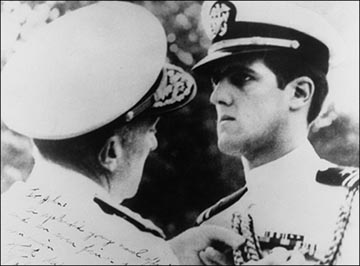 |
There
is
a
furious
debate
raging
between
Vietnam
Vets
and
John
Kerry
over
the
veracity
of
his
three
Purple
Hearts
and
medals
for
bravery
|
I'm
angry
too,
because
my
medals
were
denied
by
an
jealous
officer.
I
am
the
opposite
of
John
Kerry.
I
want
recognition
denied
me,
while
John
Kerry's
opponents
want
to
deny
his
recognition.
At
question
with
John
Kerry
is
the
veracity
of
his
three
Purple
Hearts
and
his
medals
for
bravery.
A
group
calling
itself
Swift
Boat
Veterans
For
Truth
is
at
the
center
of
the
debate.
These
former
Vietnam
Vets,
many
of
whom
served
with
Kerry,
claim
the
stories
of
his
courage
under
fire
are
fabrications,
mythical
combat
legacies
Kerry
has
built
over
the
past
three
decades
to
feather
his
political
aspirations.
Part
of
the
evidence
being
offered
by
Kerry's
critics
to
discredit
him
is
that
the
Presidential
hopeful
asked
to
be
transferred
from
Vietnam
after
four
months
and
12
days.
Regulations
at
the
time
provided
that
anyone
with
three
Purple
Hearts
could
request
relief
from
combat.
Kerry
did
just
that.
The
Swift
Boat
Veterans
For
Truth
allege
the
wounds
he
suffered
were
"band-aid"
wounds.
And
that
Kerry
was
doing
everything
possible
to
escape
his
duty
in
Vietnam
by
claiming
unwarranted
wounds.
In
today's
news,
retired
Dr.
Louis
Leston
who
treated
him
for
one
of
his
"wounds,"
recalls
it
to
be
a
sliver
in
the
arm
that
barely
punctured
the
flesh
and
required
only
a
band-aid
to
repair.
Witnesses
of
the
event
say
the
wound
was
self-inflicted
by
Kerry
when
a
mortar
he
was
firing
at
a
beach
for
practice
hit
some
rocks
and
fragment
ricocheted
back,
jamming
the
sliver
of
metal
in
his
arm.
There
is
also
the
contention
that
his
bravery
awards
were
"manufactured."
Disputes
about
what
really
happened
when
Kerry
won
his
Silver
and
Bronze
Stars
whirl
about
like
political
dust
storms.
Whatever
truths
might
exist
are
clouded
one
way
or
another.
One
report
against
Kerry
says
he
attacked
a
defenseless
village
and
shot
a
villager
in
the
back
while
he
was
running
away,
then
made
up
a
story
about
a
courageous
attack
and
how
he
led
the
charge
to
save
others
who
were
in
harm's
way.
It
seems
the
facts
are
not
available,
as
many
of
the
official
records
regarding
Kerry
have
"disappeared,"
making
it
virtually
impossible
to
verify
the
events.
Kerry
has
angered
many
Vietnam
Vets
by
throwing
his
ribbons
away
in
anti-war
demonstrations.
 |
|
"We
resent
very
deeply
the
false
war
crimes
charges
he
made
coming
back
from
Vietnam
in
1971
and
repeated
in
the
book
"Tour
of
Duty."
We
think
those
cast
an
aspersion
on
all
those
living
and
dead,
from
our
unit
and
other
units
in
Vietnam.
We
think
that
he
knew
he
was
lying
when
he
made
the
charges,
and
we
think
that
they're
unsupportable.
We
intend
to
bring
the
truth
about
that
to
the
American
people.
We
believe,
based
on
our
experience
with
him,
that
he
is
totally
unfit
to
be
the
Commander-in-Chief."
–
John
O'Neill,
spokesman,
Swift
Boat
Veterans
for
Truth
|
It
would
be
absurd
for
me
to
claim
I
knew
one
way
or
the
other
what
the
truth
is.
Only
John
Kerry
knows
that,
but
then
politicians
soon
believe
their
own
PR,
so
it
could
well
be
that
whatever
Kerry
has
told
himself
"really"
happened
has
become
his
truth.
I
only
know
a
couple
of
things
about
my
experiences
in
Vietnam
regarding
wounds
and
medals
for
bravery.
Let's
take
the
issue
of
Purple
Hearts.
If
you
wanted
a
Purple
Heart,
all
you
had
to
do
was
scratch
yourself
and
draw
blood
when
in
"enemy
territory."
Usually,
it
took
a
sniper's
bullet
to
be
fired,
or
a
booby
trap
to
be
exploded
to
really
make
it
"authentic,"
but
since
the
Viet
Cong
had
"punji"
traps
everywhere--sharpened
sticks
with
fecal
material
on
the
tips
to
scratch
and
infect
you,
or,
if
you
fell
on
one,
to
impale
you--the
"scratch"
would
work.
And,
if
you
knew
the
medic
well,
he
could
just
write
it
up.
It
was
a
red
tag
he
filled
out,
time,
date,
location
and
wound.
Anyone
could
have
gotten
one
for
virtually
any
reason
with
few
if
any
questions
asked.
I
have
a
friend
who
has
five
Purple
Hearts.
A
couple
of
them
come
from
being
bitten
by
a
Viet
Cong
when
he
was
trying
to
pull
him
out
of
spider
hole.
If
you're
looking
to
lace
your
chest
with
medals,
it
was
easy.
Sometimes
I
regret
not
putting
in
for
Purple
Hearts
for
my
"scratches,"
because
everyone
gives
you
sympathy
and
the
VA
treats
you
special.
However,
there
is
a
moral
issue
about
a
Purple
Heart.
The
Purple
Heart
was
once
our
nation's
highest
award,
for
being
"wounded"
in
battle
was
the
ultimate
sacrifice.
I
suffer
from
PTSD.
The
VA
says
it
is
war
related
and
Ground
Zero
related
since
I
was
there
at
the
time
of
the
Terrorist
attack.
If
one
carries
a
wound
around
inside
them,
then
I
deserve
a
Purple
Heart
for
Vietnam
and
for
Ground
Zero,
September
11,
2001.
But,
since
I'm
not
running
for
President
of
the
United
States,
I
can't
claim
my
rights.
Now,
let's
get
to
the
issue
of
falsification
of
medals
for
heroism.
I
was
a
good,
loyal
Marine.
And,
an
expert
writer.
Everyone
knew
I
was
both.
That's
why
the
captain
in
charge
of
S-1,
the
administrative
arm
of
the
2nd
Battalion,
7th
Marines,
came
to
me
one
evening
and
asked
me
write
up
a
medal
of
bravery
award
for
one
of
the
platoon
leaders.
He
said
I
needed
to
"write
it
up"
so
it
would
be
approved.
At
first,
I
said
sure.
He
handed
me
the
documents.
One
was
for
the
conditions
necessary
for
"bravery"
to
exist
regarding
the
medal,
and,
the
other
was
the
information
and
affidavits
about
what
the
platoon
leader
had
done.
I
read
each
carefully
and
then
turned
to
the
Captain.
"I'm
sorry
sir,"
I
said,
"but
I
can't
do
this."
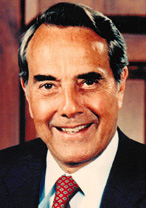 |
|
On
August
23,
2004
Former
Republican
Sen.
Bob
Dole
suggested
that
John
Kerry
apologize
for
past
testimony
before
Congress
about
alleged
atrocities
during
the
Vietnam
War
and
joined
critics
of
the
Democratic
presidential
candidate
who
say
he
received
an
early
exit
from
combat
for
"superficial
wounds."
Dole
also
called
on
Kerry
to
release
all
the
records
of
his
service
in
Vietnam
|
"What
do
you
mean,
sergeant,"
he
replied,
shocked
by
statement.
"I
mean,
according
to
the
criteria
for
the
award,
and
what
the
lieutenant
did,
he
didn't
do
anything
but
his
job.
He
was
supposed
to
lead
his
men
into
battle.
He
didn't
go
beyond
his
duty
as
a
leader."
The
captain
growled.
"I'm
ordering
you
to
write
that
award
up,
sergeant."
I
stared
at
the
Captain.
"Go
ahead
sir.
I
won't
do
it,
it's
wrong."
"You'll
get
court
martialed!"
"That's
fine,
sir.
Court
martial
me!"
The
Captain
glared
and
snatched
the
papers
from
my
hand.
We
weren't
"friends"
after
that.
Colonel
Leon
Utter,
the
battalion
commander
of
the
2nd
Battalion,
7th
Marines,
had
a
standing
order.
"All
his
officers
went
home
with
medals."
He'd
said
that
numerous
times.
It
was
his
way
of
rewarding
them,
even
if
the
medals
didn't
meet
the
courage
or
bravery
required.
At
the
time,
America
was
struggling
to
accept
the
war
in
Vietnam,
and
the
more
medals
that
were
issued,
the
more
patriotism
soared--at
least
for
those
immediate
family
members,
relatives
and
friends.
Later,
as
too
many
Purple
Hearts
were
being
given
out,
they
were
limited
only
to
those
who
required
hospitalization.
Had
John
Kerry
been
under
that
criterion,
he
wouldn't
have
earned
any.
Now,
my
medal(s).
As
a
Marine
Combat
Correspondent
charged
with
fighting
first
and
writing
second,
I
saw
more
than
my
share
of
combat.
I
witnessed
and
participated
in
more
than
100
combat
operations
from
ambushes
and
patrols,
to
major
engagements
with
the
enemy.
Colonel
Utter
put
me
in
for
a
medal,
one,
of
course,
I
deserved.
I
wasn't
attached
to
his
unit,
so
he
sent
it
back
to
headquarters
where
my
direct
superior,
a
lieutenant,
received
the
documents.
It
was
up
to
him
to
forward
them.
He
didn't
like
me
much.
I
had
a
bit
of
a
resentment
for
those
who
sat
back
in
the
headquarters
and
didn't
see
combat,
and
claimed
to
be
"combat
correspondents."
Perhaps
it
was
ego,
but
I
was
quick
to
show
my
disdain.
I
waited
and
waited.
My
medal
never
came
through.
I
checked
with
a
friend
of
mine
who
worked
for
the
lieutenant
and
he
told
me
my
papers
never
were
submitted.
I
shrugged
it
off
then,
but
later
in
life,
and
still
today,
I
feel
I
deserve
that
Navy
Commendation
Medal
with
Combat
"V."
The
other
medal
I
never
got
was
a
Bronze
or
Silver
Star.
I
had
to
award
them
to
myself,
for
no
one
else
would.
I
attached
myself
to
various
units,
joining
up
with
them
or
"tagging
along."
Many
times
no
one
in
the
command
knew
who
I
was.
I
was
just
another
Marine
grunt.
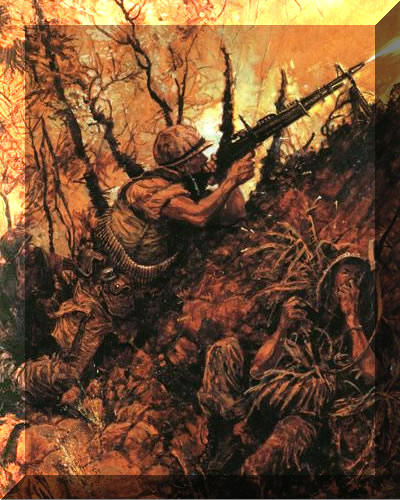 |
Had
I
been
the
company
commander
witnessing
my
actions
in
the
skirmish,
I
would
have
put
my
name
in
for
a
medal
|
The
unit
I
was
with
came
under
heavy
attack.
We
were
ambushed
on
three
sides.
The
only
escape
was
up
a
high
hill.
I
was
near
the
end
of
the
unit.
The
main
two-thirds
made
it
up
the
hill
but
our
section
was
cut
off,
pinned
down
by
heavy
fire.
Bullets
were
kicking
everywhere,
cracking
by
ear.
I
knew
we
were
all
going
to
die
because
in
a
few
minutes
the
heavy
fire
would
find
our
bodies
as
targets.
I
leapt
up
and
yelled
for
everyone
to
follow
me.
I
figured
we
all
had
to
move
because
lying
on
the
earth
was
waiting
for
a
coffin
lid
to
shut.
The
cut-off
unit
didn't
know
who
I
was.
All
they
saw
was
my
.45
and
my
6-3
frame
yelling
at
them.
Up
they
came
firing
and
running.
I
ducked
and
wove
and
made
sure
everyone
was
on
the
move
and
turned
to
run
up
the
hill.
I
caught
from
the
corner
of
my
eye
a
Marine
go
down
near
a
small
haystack.
Dodging
bullets
I
ran
to
him
and
flagged
one
of
other
last
Marines
to
help
me.
We
pulled
the
wounded
Marine
up,
wrapped
his
arm
around
our
shoulders
and
began
back
peddling
up
the
hill,
firing
as
we
went.
Bullets
were
hitting
everywhere,
cracking,
slamming
against
the
dirt
between
my
legs.
We
moved
as
fast
we
could
walking
backwards
up
the
hill
as
we
fired.
Finally,
we
reached
the
top,
a
miracle
to
say
the
least
and
a
tribute
to
the
bad
marksmanship
of
the
Viet
Cong.
No
one
said
a
word
to
me.
Even
the
guy
whose
life
I
saved
didn't
thank
me.
We
held
the
high
ground
and
called
in
air
strikes.
We
escaped.
Had
I
been
the
company
commander
of
that
unit,
and
saw
this
strange
Marine
helping
save
my
troops,
and
risking
his
life
in
the
process,
I
might
have
put
him
in
for
nice
Bronze
or
Silver.
But
that
didn't
happen.
I
probably
could
have
gone
to
the
company
commander
and
said:
"Hell,
did
you
see
what
I
just
did.
I
saved
a
third
of
your
men
who
would
have
died,
hauled
up
the
hill
one
of
your
wounded,
and
didn't
even
get
a
thank
you.
How
about
a
medal?"
I
knew
people
who
did
just
that.
They
were
the
wheels
that
squeaked.
And,
just
about
anyone
would
write
up
their
buddies
for
medals
at
the
drop
of
a
hat.
One
of
the
reasons
I
refused
the
Captain's
request
to
write
up
the
medal
for
bravery
was
because
I
believe
everyone
in
combat
is
a
hero.
I
figured
it
was
my
job
to
help
my
fellow
Marines
get
off
their
soon-to-be
dead
asses,
and
it
was
part
of
my
job
to
help
haul
another
Marine
up
a
hill.
Marine
training
is
all
about
helping
out
one
another,
leaving
no
one
behind.
In
the
most
pure
sense,
what
I
did
was
just
part
"of
my
job."
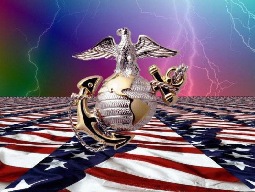 |
In
the
purest
sense,
as
a
Marine,I
was
just
"doing
my
job"
|
That's
why
I
have
an
aversion
to
John
Kerry
getting
two
medals
and
three
Purple
Hearts
in
four
months
and
12
days.
His
"combat
zone"
time
was
just
a
matter
of
weeks,
and
in
that
time
he
collected
a
legacy
of
heroism
that
seems
incredible
for
a
man
willing
to
throw
away
those
medals
in
an
anti-war
statement
that
was
politically
charged
to
seek
personal
recognition.
True
heroes
are
quiet
heroes.
Most
of
them
would
never
say
they
deserved
what
they
got,
because
they
were
just
"doing
their
jobs,"
the
same
"job"
anyone
else
would
or
should
do.
That's
how
I
felt,
and
deep
down
feel.
Any
acts
of
bravery
that
I
performed
were
part
of
my
"job,"
and
not
"special."
And,
had
I
received
the
medals,
I
would
treasure
them
with
all
my
power
and
might,
for
they
would
be
given
to
me
not
for
my
acts,
but
because
my
peers
were
thanking
me
for
doing
something
extraordinary
for
them.
That's
why
I
find
it
hard
for
John
Kerry
to
throw
away
medals
that
he
earned
for
helping
save
and
secure
the
safety
of
others.
You
just
aren't
supposed
to
get
medals
unless
you
go
"beyond
the
call
of
duty,"
and
that
"duty"
seems
to
me
to
always
be
doing
whatever
is
necessary
to
protect
your
troops.
I
don't
think
chasing
down
a
villager
accused
of
being
a
V.C.
and
shooting
him
in
the
back
is
a
qualification
for
bravery.
Neither
do
I
consider
a
fierce
firefight
in
which
one
helps
save
another's
life
anything
above
the
normal
expectation
of
a
leader.
Officers
are
coaches.
They
are
supposed
to
set
examples,
and
the
idea
that
they
get
medals
offends
me.
They
are
in
charge
of
inspiring
the
players--the
troops--and
when
they
take
the
honor
for
heroism,
they
steal
it
from
the
troops
under
them.
Is
this
sour
grapes?
I
don't
think
so.
It's
a
reality
when
you
read
about
someone
like
John
Kerry
claiming
his
"heroism"
is
a
qualification
to
become
the
Commander-In-Chief.
When
a
man
is
willing
to
throw
away
his
Medals
of
Heroism
in
disrespect
to
his
country's
legacy
of
fighting
for
others'
rights,
I
question
the
deep
character
of
such
actions,
and,
question
the
truth
of
earning
such
medals.
But
John
Kerry
is,
in
a
way,
a
victim
of
a
political
system
that
tends
to
use
medals
for
heroism
as
lubricants
for
wars
that
are
unpopular.
In
the
July
12th
New
Yorker
is
a
compelling
article
by
Dan
Baum
called
"The
Price
of
Valor."
In
the
article,
Mr.
Baum
goes
through
a
myriad
of
issues
about
the
effects
of
death
on
families
and
combat
veterans.
He
cites
one
example
of
two
Humvees
on
patrol
in
Baghdad,
and
how
the
second
one
is
blown
to
bits.
He
follows
the
bodies
of
the
two
killed
soldiers
back
to
their
hometowns
and
reports
on
the
reactions
of
the
parents
and
friends
illustrating
the
diversity
of
their
responses.
What
I
found
interesting
was
in
addition
to
being
awarded
the
Purple
Heart,
a
standard
when
someone
is
killed
in
combat,
both
of
the
dead
soldiers
were
also
given
Bronze
Stars.
With
no
disrespect
to
the
soldiers,
the
question
is:
how
did
they
earn
the
Bronze
Stars
when
both
were
inside
a
Humvee
that
was
blown
up?
Riding
in
a
vehicle
that
is
bombed
and
being
torn
into
thousands
of
pieces
is
not
deserving
of
a
medal
for
heroism.
Unless,
of
course,
you
are
issuing
the
medals
from
a
political
vista,
trying
to
quell
any
angst
among
the
parents
and
loved
ones
by
buttering
up
deaths
with
the
marmalade
of
heroism.
I
found
the
granting
of
those
Bronze
Stars
about
as
disturbing
as
I
do
the
issue
about
John
Kerry's
right
to
claim
he
is
a
hero.
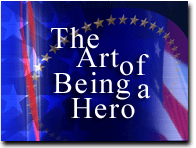 |
A
real
hero
wouldn't
have
requested
to
leave
Vietnam
immediately
after
receiving
non-life-threatening
scratches/wounds
|
A
real
hero,
in
my
opinion,
would
not
have
requested
to
leave
Vietnam
immediately
after
getting
his
third
Purple
Heart,
even
if
it
was
a
"legal"
band-aid
wound.
After
four
months
and
12
days,
and
a
very
small
amount
of
that
in
combat,
it
doesn't
correlate
that
a
man
of
heroic
skills
and
leadership
would
abandon
his
men
and
his
country
because
of
a
few
"scratches."
And,
to
bandstand
the
fact
that
because
of
these
"medals"
John
Kerry
is
a
proven
Commander-In-Chief
requires
a
fogged
brain
and
a
blind
belief
that
a
man
who
volunteers
to
leave
his
men
is
worthy
of
fighting
Terrorism
and
winning.
I'd
like
to
brag
about
my
medals,
but
I
have
no
official
ones.
But
I
do
know
what
I
did
and
why
I
did
it.
Had
I
been
given
medals,
I
would
never
throw
them
away.
And,
I
wouldn't
use
them
to
claim
my
heroism
or
valor.
The
last
I
heard,
heroism
was
a
selfless
act,
not
one
designed
to
get
votes.
Go
To
Yesterday's
Story:
Art
Terrorists
Steal
Beast
Of
Terror's
Scream

»
leave
your
thoughts
about
this
story
in
our
Guest
Book
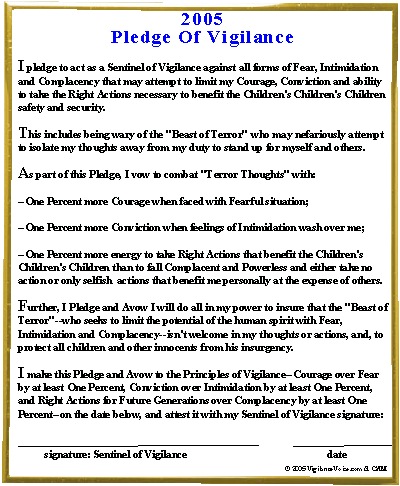

.jpg)







